Pykot Surname Ancestry ResultsOur indexes 1000-1999 include entries for the spelling 'pykot'. In the period you have requested, we have the following 22 records (displaying 11 to 20): Single Surname Subscription | | | Buying all 22 results of this search individually would cost £106.00. But you can have free access to all 22 records for a year, to view, to save and print, for £100. Save £6.00. More... |
These sample scans are from the original record. You will get scans of the full pages or articles where the surname you searched for has been found. Your web browser may prevent the sample windows from opening; in this case please change your browser settings to allow pop-up windows from this site. Inhabitants of London
(1275-1298)
Liber Horn or the Lesser Black Book, now known as Letter Book A of the City of London contains enrolments of recognizances between inhabitants, particularly citizens, for sums of money lent or due; grants of pieces of land or property; and various records relating to the city administration. The letter books are so called because they were lettered from A to Z and from AA to ZZ, not because they were books of letters. Letter Book A was edited by Reginald R. Sharpe for the corporation and printed in 1899.
PYKOT. Cost: £4.00.  | Sample scan, click to enlarge

| Wiltshire Feet of Fines
(1273-1326)
Pedes Finium - law suits, or pretended suits, putting on record the ownership of land in Wiltshire. These abstracts were prepared by R. B. Pugh for the Wiltshire Archaeological and Natural History Society Records Branch and published in 1939, under the title 'Abstracts of Feet of Fines relating to Wiltshire for the Reigns of Edward I and Edward II'. Pugh made abstracts not only of the Wiltshire feet of fines for the two reigns but also of the Wiltshire content of those feet of fines covering two or more counties, which are archived separately under 'Divers Counties'. Each entry starts with a sequential number within the regnal year. The date then given is the date on which the original writ was returnable in court, rather than the date on which proceedings were completed. The dates do not fall on the quarter days themselves (Michaelmas, Hilary, Easter and Trinity) but on the octave (oct., 7 days after), quindene (quin., 14 days after), or three weeks later, &c. Then there is the name of the party initiating the action (X: pl., plaintiff, or dem., demandant), and then that of the defendant (def.) or impedient (imp.) (Y). Then there is a summary description of the land involved; and then a code indicating the precise nature of the action. Seven of these (A. to G.) are variants on the theme of X having acknowledged the premises to be the right of Y; but H. indicates a simple complete grant from X to Y, complete with actual transfer of possession. In cases B., C., E. and G. it is X, not Y, on whom the property is settled. If there is a warranty clause, or a more involved settlement, the details are given.PYKOT. Cost: £4.00.  | Sample scan, click to enlarge
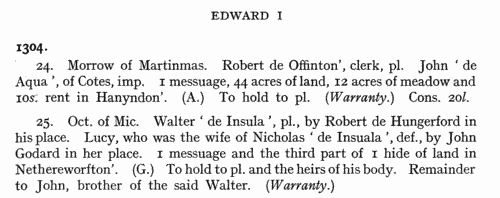
| Inhabitants of London
(1337-1352)
Letter Book F of the City of London contains enrolments of recognizances between inhabitants, particularly citizens, for sums of money lent or due; grants of pieces of land or property; and various records relating to the city administration, minor infractions, &c. The book includes an assessment of the inhabitants in 1346 (pages 143 to 149) listing many householders; a list of mayors and sheriffs from 1189 to 1548 (276-303), and records of the city's use of infangthef (summary execution of certain criminals) down to 1409. The text was edited by Reginald R. Sharpe and printed by order of the Corporation of the City of London in 1904.
PYKOT. Cost: £4.00.  | Sample scan, click to enlarge

| Inhabitants of London
(1352-1374)
Letter Book G of the City of London contains enrolments of recognizances between inhabitants, particularly citizens, for sums of money lent or due; grants of pieces of land or property; and various records relating to the city administration.
PYKOT. Cost: £4.00.  | Sample scan, click to enlarge
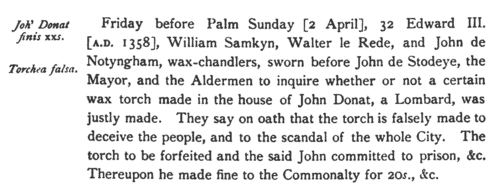
| Oxfordshire Charters
(1370-1379)
A large accumulation of documents preserved in the Bodleian Library, Oxford, formerly constituted the antiquarian collections of Anthony a Wood, Roger Dodsworth, Ralph Thoresby, Thomas Martin of Palgrave, Thomas Tanner bishop of St Asaph, Dr Richard Rawlinson, Richard Furney archdeacon of Surrey, and Richard Gough. A calendar of these was prepared by William H. Turner and published in 1878 under the title 'Calendar of Charters and Rolls preserved in the Bodleian Library'. The word 'charters' is here used in a rather loose sense, including virtually any manuscript or copy of a manuscript, but the bulk of the contents consists of mediaeval deeds of conveyance. Turner's calendar deals with each briefly, naming the principal parties and the nature of the deed, but hardly ever lists the witnesses. Many of these charters were undated (dating of deeds did not become general until around 1350) or so damaged or defective ('mutilated' is Turner's usual description) as no longer to display a legible date. However, he contrived, from the style of the script and/or the nature of the contents, to estimate dates in such cases. The sample scan is from the start of the Bedfordshire list. PYKOT. Cost: £4.00.  | Sample scan, click to enlarge
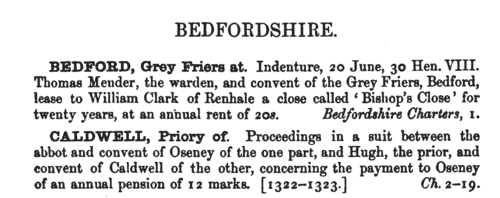
| Hampshire and Surrey clerks, clerics, monks and clergy
(1386)
Ordinations as acolytes, subdeacons, deacons and priests, from the register of bishop William de Wykeham of Winchester. Winchester diocese covered Hampshire and Surrey; the ordinations also attracted many persons from distant dioceses bearing letters dimissory from their ordinaries, and these are duly noted in the text. Many of these clerks would not go on to obtain benefices and remain celibate. The lists of subdeacons, deacons and priests state the clerks' respective titles, i. e., give the names of the person or religious house undertaking to support them. Monks and friars are indicated ('f.' = brother). The acolyte lists usually give parish of origin or title. The sample scan is from 1404.PYKOT. Cost: £6.00.  | Sample scan, click to enlarge
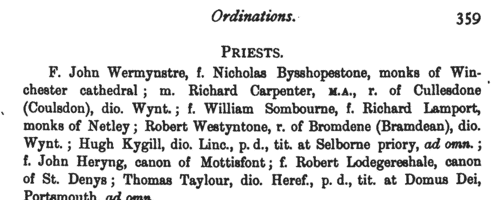
| Oxfordshire Charters
(1380-1389)
A large accumulation of documents preserved in the Bodleian Library, Oxford, formerly constituted the antiquarian collections of Anthony a Wood, Roger Dodsworth, Ralph Thoresby, Thomas Martin of Palgrave, Thomas Tanner bishop of St Asaph, Dr Richard Rawlinson, Richard Furney archdeacon of Surrey, and Richard Gough. A calendar of these was prepared by William H. Turner and published in 1878 under the title 'Calendar of Charters and Rolls preserved in the Bodleian Library'. The word 'charters' is here used in a rather loose sense, including virtually any manuscript or copy of a manuscript, but the bulk of the contents consists of mediaeval deeds of conveyance. Turner's calendar deals with each briefly, naming the principal parties and the nature of the deed, but hardly ever lists the witnesses. Many of these charters were undated (dating of deeds did not become general until around 1350) or so damaged or defective ('mutilated' is Turner's usual description) as no longer to display a legible date. However, he contrived, from the style of the script and/or the nature of the contents, to estimate dates in such cases. The sample scan is from the start of the Bedfordshire list. PYKOT. Cost: £4.00.  | Sample scan, click to enlarge
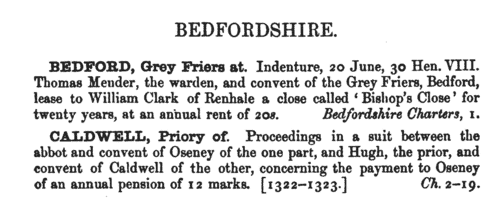
| Inhabitants of London
(1375-1399)
Letter Book H of the City of London contains enrolments of recognizances between inhabitants, particularly citizens, for sums of money lent or due; grants of pieces of land or property; and various records relating to the city administration.
PYKOT. Cost: £4.00.  | Sample scan, click to enlarge

| The English in France
(1433)
King Henry VI of England (one of the grandsons of Charles VI of France) claimed the throne of France (and quartered the fleurs-de-lis of France with the lions of England on the royal standard) as had his predecessors since Edward III, as descendants of Philip IV of France. The English had real power or influence in Brittany, Normandy, Flanders and Gascony, and actual possession of several coastal garrisons, in particular Calais, where the French inhabitants had been replaced by English. Henry VI came to the throne only seven years after his father had trounced the French at Agincourt; but his cousin, Charles VII, who became king of France in the same year, spent his long reign rebutting the English king's claim to his throne by territorial reconquest and consolidation. The English administration kept a series of records called the French Rolls. On these are recorded royal appointments and commissions in France; letters of protection and safe-conduct to soldiers, merchants, diplomats and pilgrims travelling to France from England and returning, and to foreign legations. There are also licences to merchants to export to the Continent, and to captains to transport pilgrims. As Henry VI's reign progressed, and the English grip on northern France loosened, the French Rolls also increasingly include entries concerning the ransoming of English prisoners.PYKOT. Cost: £6.00.  | Sample scan, click to enlarge
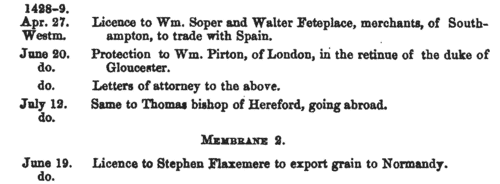
| Close Rolls
(1429-1435)
The close rolls of the 8th to 13th years of the reign of king Henry VI record the main artery of government administration in England, the orders sent out day by day to individual officers, especially sheriffs of shires: they are an exceptionally rich source for so early a period. There is also some material relating to Wales, Scotland, Ireland and the English possessions in France. Also included is the Exchange Roll of 1424 to 1434, of licences to transmit sums of money out of the realm.PYKOT. Cost: £4.00.  | Sample scan, click to enlarge

|
Research your ancestry, family history, genealogy and one-name study by direct access to original records and archives indexed by surname.
|












